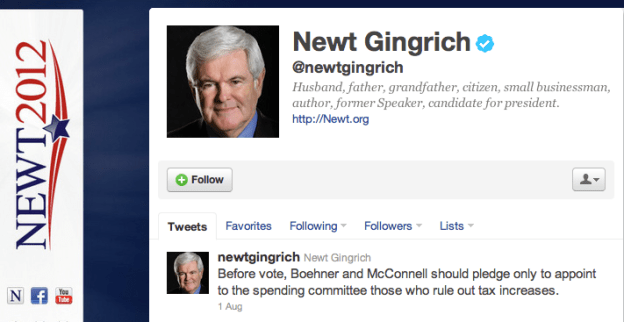
Newt Gingrich is familiar wading through controversies of debatable merit, and has recently found himself in a new one. An anonymous former staffer accused the GOP presidential hopeful of having bought or fabricated almost all of his 1.3 million Twitter followers. By comparison, Mitt Romney and Michele Bachmann have not broken 70,000.
The scrutiny would likely not have come to pass had Gingrich not cried foul that the media was not acknowledging his robust following. The quote from the former staffer stated:
“About 80 percent of those accounts are inactive or are dummy accounts created by various “follow agencies,” another 10 percent are real people who are part of a network of folks who follow others back and are paying for followers themselves (Newt’s profile just happens to be a part of these networks because he uses them, although he doesn’t follow back), and the remaining 10 percent may, in fact, be real, sentient people who happen to like Newt Gingrich. If you simply scroll through his list of followers you’ll see that most of them have odd usernames and no profile photos…”
Anonymous accusations by former staffers do not a fact make; the Gingrich campaign had a fairly spectacular implosion last June so these could be sour grapes. But regardless, these are the types of debates the blogosphere loves and there has been no shortage of opinion and analysis.
PeakYou, a Twitter analytics firm in New York, analyzed Newt’s followers and had this to say:
“The Consumer Ratio measures the percentage of a Twitter audience that is identified as a “consumer” or “voter” in Newt’s case, vs business, private/anonymous and spam accounts. The average range sits anywhere between 30-60% human depending on this type of account. Newt’s was 8% — the lowest the team had ever seen by 5%.”
Both Dave Weigel of Slate and Ben Smith of Politico, normally not Republican enthusiasts, have both cast doubt on the staffer’s claims even still, citing that Gingrich had a huge number of Twitter followers before the campaign started, that his followers have come on gradually over a year.
However, one has to give Gingrich or his still-employed staff enough credit to know that showing a huge spike in followers at one time would be far more suspicious than buying them slowly. PeakYou’s findings do seem a little more damning.
Let the accusations (and spin) continue. A candidate being exposed for Twitter fraud would certainly be a new one.
Editors' Recommendations
- X (formerly Twitter) returns after global outage
- X, formerly Twitter, looks set to become subscription-only
- The most followed Twitter accounts
- Mike Pence’s fly has already amassed 90,000 followers on Twitter
- Twitter permanently bans former KKK leader David Duke


